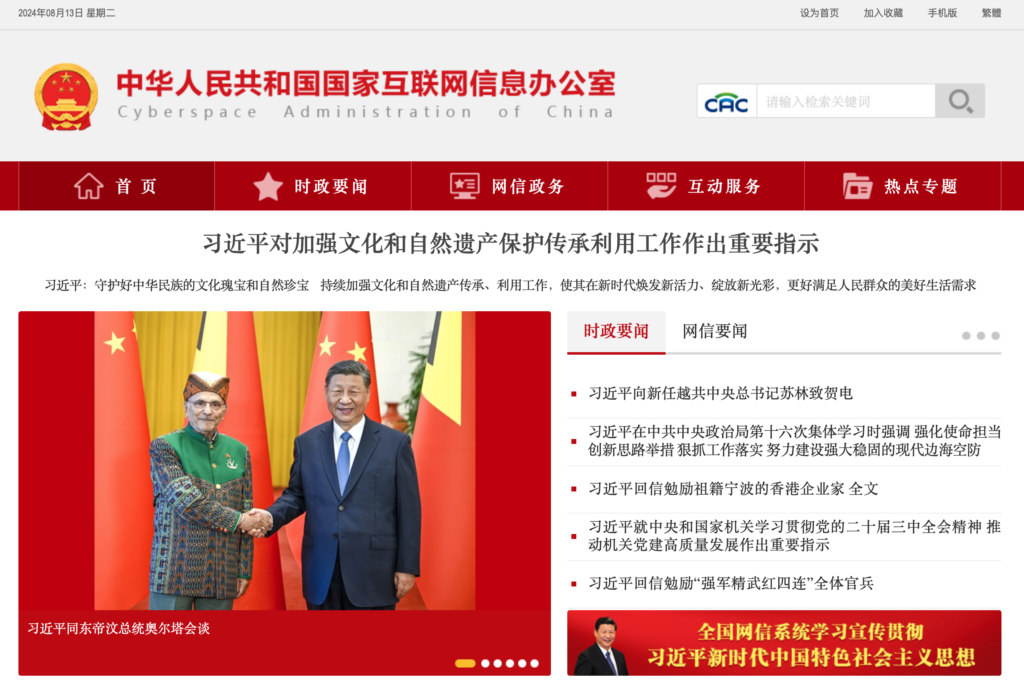As we move into 2025, data protection in China remains a critical consideration for businesses operating within or interacting with the Chinese market. The country's regulatory landscape is marked by comprehensive laws designed to safeguard personal information and national security. This blog will provide a detailed overview of the current data protection laws in China, including recent updates and implications for businesses.
From establishing a legal presence to ensuring ongoing conformity, our China Digital Compliance Services provide you with industry-specific guidance.
While brands conducting business through third-party marketplaces can easily abide by local regulations thanks to each platform’s policies, companies running self-operated branded eCommerce stores face significant compliance challenges when conducting cross-border operations and directly processing user data. Understanding and complying with these data regulations is the basis for successful market entry and avoiding unnecessary compensation or legal liability.
Introduction to China’s Data Protection Framework
China’s data protection laws have evolved rapidly in recent years, reflecting the global trend towards greater data privacy and security. The cornerstone of this legal framework is the Personal Information Protection Law (PIPL), complemented by the Data Security Law (DSL), the Cybersecurity Law (CSL) and the 2025 Network Data Security Management Regulations. These laws collectively establish strict requirements for the handling, storage, and transfer of data, particularly personal information.
We recently wrote about Data Protection Laws in Japan: Overview (2024)This article serves as a data compliance guide for eCommerce businesses expanding into Japan, analyzing privacy law changes and compliance needs for cross-border eCommerce.data regulations in Southeast Asia, Data Protection Laws in Japan: Overview (2024)This article serves as a data compliance guide for eCommerce businesses expanding into Japan, analyzing privacy law changes and compliance needs for cross-border eCommerce.Australia, and Data Protection Laws in Japan: Overview (2024)This article serves as a data compliance guide for eCommerce businesses expanding into Japan, analyzing privacy law changes and compliance needs for cross-border eCommerce.Japan according to the latest laws in Data Protection.

In addition to these specialized data protection laws, China's broader legal framework also supports data privacy through its Civil Code, Constitutional Provisions, and Criminal Law Provisions. The Civil Code, which came into effect on January 1, 2021, recognizes the right to privacy as a fundamental civil right, offering protection against the misuse of personal data. Constitutional provisions also reinforce the protection of personal information, aligning with the state's commitment to safeguarding citizens' privacy and personal dignity. Moreover, China's Criminal Law includes provisions that penalize illegal access to personal information and other data breaches, underscoring the serious consequences of non-compliance with data protection standards. Together, these legal instruments create a comprehensive framework that emphasizes the importance of data privacy as both a civil and criminal matter in China.
1. Personal Information Protection Law (PIPL)
The PIPL, often compared to the European Union’s General Data Protection Regulation (GDPR), is the primary law governing personal data protection in China. It applies not only to entities operating within China but also to those outside the country that process the personal data of Chinese citizens.
Key Provisions
- Consent: Explicit consent is required for the collection, processing, and transfer of personal data. Organizations must provide clear and transparent information about how data will be used.
- Individual Rights: Data subjects have the right to access, correct, delete their data, and withdraw consent at any time.
- Cross-Border Data Transfers: Transfers of personal data outside China require security assessments and potentially government approval, especially if the data is deemed sensitive or critical.
- Penalties: Non-compliance with the PIPL can result in severe penalties, including fines up to 5% of annual revenue or RMB 50 million, and potential suspension of operations.
Recent Updates
In 2023, there were refinements to the PIPL aimed at clarifying the procedures for cross-border data transfers and enhancing protections for data subjects. These updates reflect a balancing act between safeguarding personal information and facilitating international business.
2. Data Security Law (DSL)
The DSL, effective from September 2021, focuses on the protection of data that could impact national security and public interest. It mandates strict data classification and security measures based on the importance of the data.
Key Provisions
- Data Classification: Data must be classified based on its significance to national security, economic stability, and public interest. Businesses are required to implement corresponding security measures.
- Security Assessments: Before transferring important data outside China, businesses must conduct security assessments and obtain approvals from relevant authorities.
- Penalties: Violations of the DSL can result in significant fines and administrative actions, including the suspension of business activities.
2023 and 2024 Developments
In response to concerns about the potential economic impact of stringent cross-border data restrictions, China’s cybersecurity authorities proposed easing some DSL requirements in 2023. These proposed changes are intended to create a more business-friendly environment while maintaining data security.
3. Cybersecurity Law (CSL)
Enacted in June 2017, the CSL was China’s first comprehensive law focusing on cybersecurity and personal data protection. It obligates network operators and critical information infrastructure operators (CIIOs) to secure their networks and protect personal data.
Key Provisions
- Data Localization: CIIOs are required to store personal data collected within China on servers located within the country.
- Network Security: Organizations must implement security measures, conduct regular risk assessments, and report security incidents.
- Cross-Border Data Transfers: Similar to the PIPL and DSL, the CSL imposes restrictions on transferring data outside China, particularly for CIIOs.
Ongoing Impact
The CSL continues to play a pivotal role in China’s cybersecurity framework, particularly in its emphasis on data localization and network security. The law’s implementation has been refined over the years to address the evolving cybersecurity landscape.
4. Network Data Security Management Regulations
First announced on September 2024, the Network Data Security Management Regulations introduce comprehensive measures to strengthen the security of network data, addressing both personal and important data categories for both domestic and cross-border data transfers. Effective January 1, 2025, these regulations aim to bolster data protection and mitigate security risks.
- Data Classification and Protection: Organizations must classify data based on its level of importance to national security, economic stability, and public interest. Corresponding protective measures must be implemented.
- Incident Reporting Requirements: Businesses are required to report data breaches and other security incidents to authorities promptly, ensuring swift responses to mitigate risks.
- Risk Assessments: Regular risk evaluations are mandatory, especially when processing sensitive data or transferring it across borders, as well as for platforms with large numbers of registered or active users.
The regulations underscore the importance of a proactive approach to data governance and security, placing significant responsibilities on network operators and data processors.
5. Sector-specific and Supporting Regulations
In addition to the three core laws, China has introduced various sector-specific regulations that further detail data protection requirements in particular industries, such as telecommunications, finance, and healthcare.
Provisions on the Protection of Personal Information of Children: These provisions offer additional protections for the personal information of minors under 14 years old, requiring parental consent and implementing stricter security measures.
Provisions on Internet Security Supervision and Inspection by Public Security Organs: These provisions empower public security organs to conduct internet security inspections and audits, ensuring compliance with data protection and cybersecurity laws.
Other regulations that companies might be subject to depending on their specific industry or business model include:
- Regulations of Security Protection of Critical Information Infrastructure
- Administrative Regulations on the Credit Reference Sector
- Rules on the Scope of Necessary Personal Information for Common Types of Mobile Internet Applications
- Methods for Identifying Unlawful Acts of Applications to Collect and Use Personal Information
- Measures for the Security Assessment of Cross-border Data Transfers
- Guideline to Applications for Security Assessment of Cross-border Data Transfers (First Edition)
- Measures for the Standard Contract for Cross-Border Transfer of Personal Information
- Guidelines for Filing the Standard Contract for Outbound Cross-Border Transfer of Personal Information (First Edition)
- Interim Measures for the Management of Generative Artificial Intelligence Services
- Administrative Provisions on Deep Synthesis in Internet-based Information Services
- Provisions on the Administration of Algorithm-generated Recommendations for Internet Information Services
Key Compliance Challenges for Businesses
Cross-Border Data Transfers: One of the most challenging aspects of China’s data protection regime is the stringent requirements for cross-border data transfers. Businesses must navigate complex approval processes and conduct thorough security assessments to ensure compliance.
Data Localization: For CIIOs and other specified organizations, the requirement to store data locally within China can pose significant operational challenges, particularly for multinational companies that rely on global data flows.
Balancing Compliance and Business Needs: Companies must find a balance between complying with China’s rigorous data protection laws and maintaining efficient business operations. This often involves adopting robust data governance frameworks and investing in compliance technologies.
2025 Outlook: What to Expect
Increased Enforcement and Penalties: Despite the potential easing of certain requirements, enforcement of data protection laws is likely to become more stringent in 2025, especially given the recent introduction of the Network Data Security Management Regulations. Companies should be prepared for increased scrutiny and the possibility of substantial penalties for non-compliance.
Focus on Emerging Technologies: As China continues to lead in areas like artificial intelligence and big data, expect to see new regulations addressing the privacy and security challenges posed by these technologies. Businesses operating in these fields should stay informed about regulatory developments and adjust their compliance strategies accordingly.
Draft Measures for Certification of Personal Information Protection for Cross-border Data Transfers
In January 2025, the Cyberspace Administration of China (CAC) proposed draft Measures for Certification of Personal Information Protection for Cross-Border Transfers. If implemented, this certification mechanism would provide an alternative to security assessments and SCCs. The feedback deadline is February 3, 2025, and could serve as a crucial component to China's data protection overseas.
- Potential Benefits: This would allow businesses to certify their data protection practices through authorized bodies, simplifying compliance for international data flows.
- Preparation Steps: Organizations should closely monitor the progress of these draft measures and assess their readiness to adopt a certification-based approach.
Main Regulatory Authorities Overseeing Data Protection in China
China's data protection framework is overseen by several key regulatory authorities, each with distinct responsibilities for enforcing compliance, monitoring cybersecurity, and protecting personal information. These authorities work together to ensure that businesses operating within or interacting with the Chinese market adhere to the country's stringent data protection laws.
1. Cyberspace Administration of China (CAC)
The Cyberspace Administration of China (CAC) is the primary regulatory body responsible for overseeing data protection and cybersecurity in China. The CAC plays a central role in formulating and enforcing regulations such as the Personal Information Protection Law (PIPL), Data Security Law (DSL), and Cybersecurity Law (CSL). The CAC is also tasked with conducting security assessments for cross-border data transfers, issuing guidance on data protection practices, and overseeing the implementation of data localization requirements.
2. Ministry of Industry and Information Technology (MIIT)
The Ministry of Industry and Information Technology (MIIT) is responsible for regulating China’s telecommunications, internet, and information technology sectors. MIIT enforces data protection regulations within these industries, ensuring that businesses comply with relevant laws such as the Telecommunications Regulations and the Internet Information Services Administrative Measures. The MIIT also plays a role in cybersecurity, particularly in overseeing the secure operation of networks and the protection of personal information within the telecom and IT sectors.
3. Ministry of Public Security (MPS)
The Ministry of Public Security (MPS) is charged with maintaining public security, which includes enforcing cybersecurity and data protection laws. The MPS has the authority to conduct inspections and audits of network operators to ensure compliance with the Cybersecurity Law and other relevant regulations. The MPS also investigates and penalizes illegal activities related to data breaches, unauthorized access, and misuse of personal information.
4. State Administration for Market Regulation (SAMR)
The State Administration for Market Regulation (SAMR) oversees market regulation, including consumer protection and anti-monopoly enforcement. SAMR’s role in data protection includes ensuring that businesses do not engage in unfair practices related to the collection and use of personal information. The agency also addresses consumer complaints related to data privacy and enforces penalties for violations under laws such as the E-commerce Law and Consumer Protection Law.
5. National Information Security Standardization Technical Committee (TC260)
The National Information Security Standardization Technical Committee (TC260) is responsible for developing and promoting national standards related to information security and data protection. TC260’s work includes the creation of technical standards and guidelines that businesses must follow to comply with data protection laws. The committee’s standards help ensure that data security measures are consistently applied across industries, supporting the overall effectiveness of China’s data protection regime.
6. Industry-Specific Regulators and Relevant Authorities
In addition to the general regulatory bodies, several industry-specific regulators and authorities oversee data protection within particular sectors. These regulators play a crucial role in enforcing compliance with sector-specific data protection requirements:
- People's Bank of China (PBOC)
- China Banking and Insurance Regulatory Commission (CBIRC)
- China Securities Regulatory Commission (CSRC)
- National Health Commission (NHC)
- State Administration of Radio and Television (SART)
- Ministry of Education (MOE)
- National Medical Products Administration (NMPA)
Ensuring Legal Compliance with TMO
China’s data protection landscape is complex and rapidly evolving, with significant implications for both domestic and international businesses. As 2024 unfolds, companies must stay vigilant in their compliance efforts, particularly in areas like cross-border data transfers, data localization, and cybersecurity. By understanding the nuances of China’s data protection laws and implementing robust compliance strategies, businesses can navigate this challenging environment and continue to thrive in the Chinese market.
For companies seeking expert guidance on navigating China’s data protection regulations, partnering with a specialized compliance services agency can provide the necessary expertise and support. As these regulations continue to evolve, staying ahead of the curve is not just a legal requirement but a strategic imperative.
Ready to start your project? contact us for expert guidance in China Digital Compliance.













